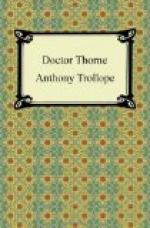To this Augusta said nothing in objection. Whether desirable by a De Courcy or not, the match was to be hers, and there was no doubt whatever as to the wealth of the man whose name she was to take; the offer had been made, not to her, but to her aunt; the acceptance had been expressed, not by her, but by her aunt. Had she thought of recapitulating in her memory all that had ever passed between Mr Moffat and herself, she would have found that it did not amount to more than the most ordinary conversation between chance partners in a ball-room. Nevertheless, she was to be Mrs Moffat. All that Mr Gresham knew of him was, that when he met the young man for the first and only time in his life, he found him extremely hard to deal with in the matter of money. He had insisted on having ten thousand pounds with his wife, and at last refused to go on with the match unless he got six thousand pounds. This latter sum the poor squire had undertaken to pay him.
Mr Moffat had been for a year or two MP for Barchester; having been assisted in his views on that ancient city by all the De Courcy interest. He was a Whig, of course. Not only had Barchester, departing from the light of other days, returned a Whig member of Parliament, but it was declared, that at the next election, now near at hand, a Radical would be sent up, an man pledged to the ballot, to economies of all sorts, one who would carry out Barchester politics in all their abrupt, obnoxious, pestilent virulence. This was one Scatcherd, a great railway contractor, a man who was a native of Barchester, who had bought property in the neighbourhood, and who had achieved a sort of popularity there and elsewhere by the violence of his democratic opposition to the aristocracy. According to this man’s political tenets, the Conservatives should be laughed at as fools, but the Whigs should be hated as knaves.
Mr Moffat was now coming down to Courcy Castle to look after his electioneering interests, and Miss Gresham was to return with her aunt to meet him. The countess was very anxious that Frank should also accompany them. Her great doctrine, that he must marry money, had been laid down with authority, and received without doubt. She now pushed it further, and said that no time should be lost; that he should not only marry money, but do so very early in life; there was always a danger in delay. The Greshams—of course she alluded only to the males of the family—were foolishly soft-hearted; no one could say what might happen. There was that Miss Thorne always at Greshamsbury.
This was more than Lady Arabella could stand. She protested that there was at least no ground for supposing that Frank would absolutely disgrace his family.
Still the countess continued: ‘Perhaps not,’ she said; ’but when young people of perfectly different ranks were allowed to associate together, there was no saying what danger might arise. They all know that old Mr Bateson—the present Mr Bateson’s father—had gone off with the governess; and young Mr Everbeery, near Taunton, had only the other day married a cook-maid.’




